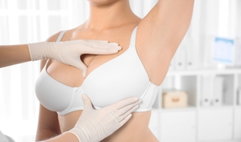Like any other type of surgery, breast augmentation comes with risks. Selecting a plastic surgeon certified by the American Board of Plastic Surgery is a great start in reducing your risks, as you can be certain that your surgeon has received a formal education in plastic and reconstructive surgery. However, problems do arise sometimes. If you're opting to have breast augmentation surgery, familiarize yourself with the risks. Learn what you can do to help reduce your risks, and talk with your surgeon.
Allergan voluntarily issued a worldwide recall of its line of BIOCELL textured implants and tissue expanders on July 24, 2019, after the U.S. Food and Drug Administration (FDA) determined these particular devices increase women's risk of developing a rare cancer of the immune system called breast im ...Continue Reading
Allergan voluntarily issued a worldwide recall of its line of BIOCELL textured implants and tissue expanders on July 24, 2019, after the U.S. Food and Drug Administration (FDA) determined these particular devices increase women's risk of developing a rare cancer of the immune system called breast im ...Continue Reading
Breast implant-associated anaplastic large cell lymphoma (BIA-ALCL) is a rare lymphoma that seems to develop mostly in women with Allergan Biocell textured implants and textured tissue expanders. Currently, there are 573 unique cases of BIA-ALCL worldwide and of those, 481 have been directly linked ...Continue Reading
Breast implant-associated anaplastic large cell lymphoma (BIA-ALCL) is a rare lymphoma that seems to develop mostly in women with Allergan Biocell textured implants and textured tissue expanders. Currently, there are 573 unique cases of BIA-ALCL worldwide and of those, 481 have been directly linked ...Continue Reading
The vast majority of women with breast implants have no adverse reactions, but growing evidence suggests a small number of patients may have biological responses to the implant materials. Symptoms like fatigue, brain fog, rash, memory loss, and joint pain have been reported by enough women with br ...Continue Reading
The vast majority of women with breast implants have no adverse reactions, but growing evidence suggests a small number of patients may have biological responses to the implant materials. Symptoms like fatigue, brain fog, rash, memory loss, and joint pain have been reported by enough women with br ...Continue Reading
Symmastia is commonly referred to as "breadloafing", or "kissing implants", or "uniboob". With this condition, the implants actually meet in the middle of the chest, giving the appearance of one breast, instead of two. What causes symmastia? Symmastia is usually a result of over-dissection of the ...Continue Reading
Symmastia is commonly referred to as "breadloafing", or "kissing implants", or "uniboob". With this condition, the implants actually meet in the middle of the chest, giving the appearance of one breast, instead of two. What causes symmastia? Symmastia is usually a result of over-dissection of the ...Continue Reading
When a patient develops symmastia, or a uniboob, due to overdissection of the tissues in the cleavage area during a breast augmentation, revisionary breast surgery can correct malposition of the breast implants. However, it is very important that the patient have a qualified surgeon performing their ...Continue Reading
When a patient develops symmastia, or a uniboob, due to overdissection of the tissues in the cleavage area during a breast augmentation, revisionary breast surgery can correct malposition of the breast implants. However, it is very important that the patient have a qualified surgeon performing their ...Continue Reading
Breast implant manufacturers concur that breast implants are not considered lifetime devices—they may rupture or deflate. While ruptures can occur at any time after surgery, they are more likely to transpire the longer the implant has been implanted. Why do ruptures occur? Ruptures can hap ...Continue Reading
Breast implant manufacturers concur that breast implants are not considered lifetime devices—they may rupture or deflate. While ruptures can occur at any time after surgery, they are more likely to transpire the longer the implant has been implanted. Why do ruptures occur? Ruptures can hap ...Continue Reading
Updated September 2018 Capsular contracture is one of the most common complications after breast augmentation surgery. Your body’s normal response to the surgical placement of a breast implant is to form a contiguous scar around the implant capsule. Sometimes, however, the response is too agg ...Continue Reading
Updated September 2018 Capsular contracture is one of the most common complications after breast augmentation surgery. Your body’s normal response to the surgical placement of a breast implant is to form a contiguous scar around the implant capsule. Sometimes, however, the response is too agg ...Continue Reading
Necrosis after breast surgery is a rare complication where breast tissue or breast fat dies, usually due to poor blood supply. The dead cells can be felt as a lump and cause discoloration, pus drainage and other symptoms. Necrosis is certainly a scary-sounding condition and can cause major dist ...Continue Reading
Necrosis after breast surgery is a rare complication where breast tissue or breast fat dies, usually due to poor blood supply. The dead cells can be felt as a lump and cause discoloration, pus drainage and other symptoms. Necrosis is certainly a scary-sounding condition and can cause major dist ...Continue Reading
You just had a breast augmentation or are on the path to getting one. You should know that infection, while rare, is most likely to occur within 20 days after surgery. Familiarize yourself with this risk and be on the watch for symptoms. The sooner your infection is treated, the more likely your i ...Continue Reading
You just had a breast augmentation or are on the path to getting one. You should know that infection, while rare, is most likely to occur within 20 days after surgery. Familiarize yourself with this risk and be on the watch for symptoms. The sooner your infection is treated, the more likely your i ...Continue Reading
Updated September 2018 You had a breast augmentation, and now you've found a firm lump beneath the skin that is accompanied by a bruise. Is it a hematoma? Is it something more serious? Learn about hematoma signs and symptoms, and how to treat a hematoma. What is a breast hematoma? A breast h ...Continue Reading
Updated September 2018 You had a breast augmentation, and now you've found a firm lump beneath the skin that is accompanied by a bruise. Is it a hematoma? Is it something more serious? Learn about hematoma signs and symptoms, and how to treat a hematoma. What is a breast hematoma? A breast h ...Continue Reading





















